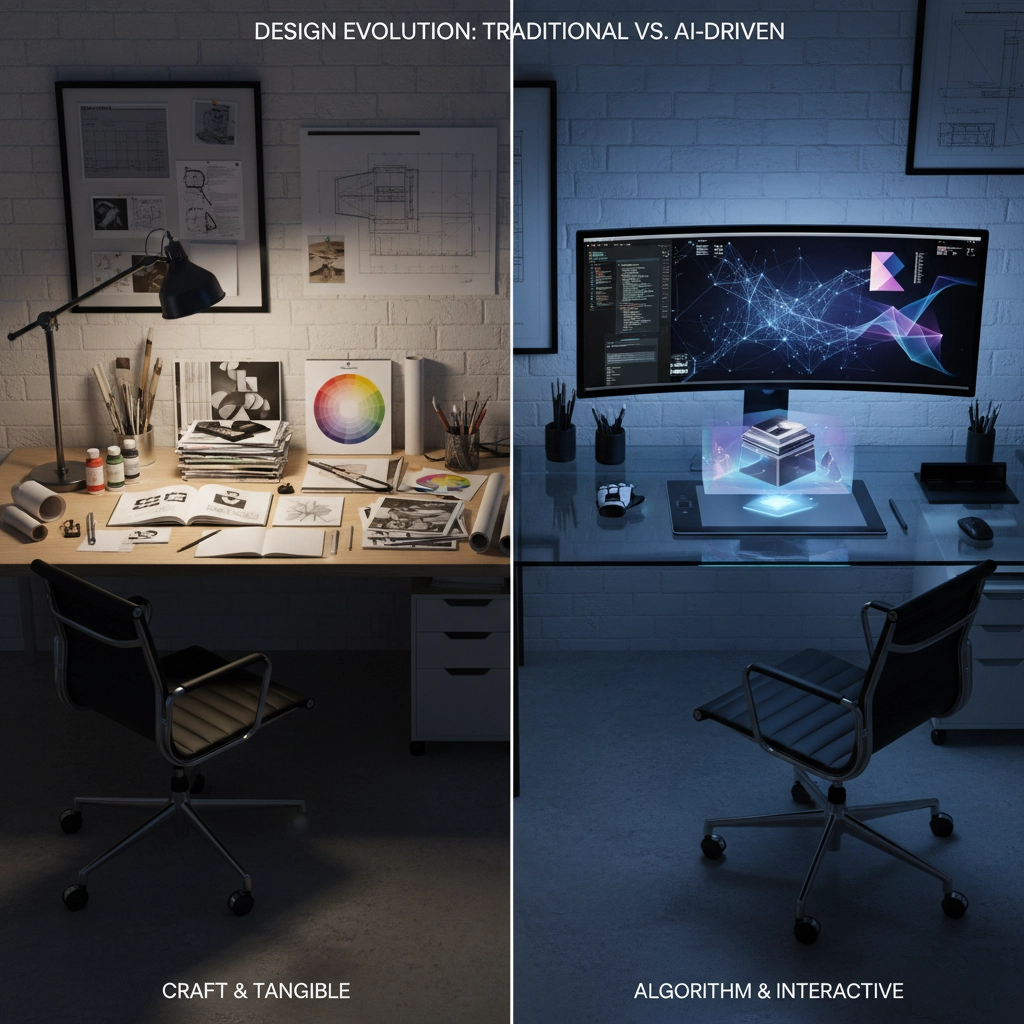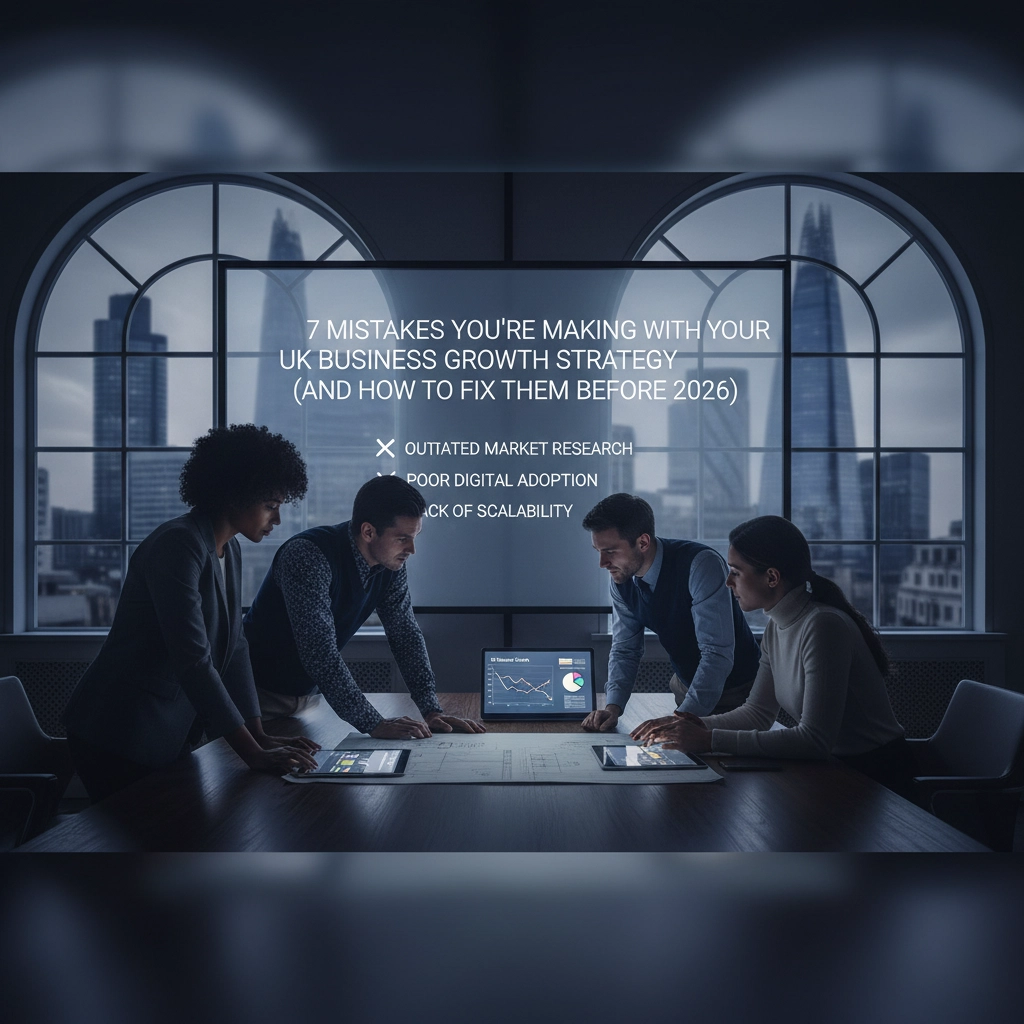Choosing the right digital design studio in 2025 isn't just about finding someone who can make your website look good. We're seeing a fundamental shift in how UK businesses approach design: and the choice between traditional agencies and AI-native studios could make or break your project timeline, budget, and results.
The UK digital design market has split into two distinct camps, each with compelling advantages. Traditional agencies still dominate the high-end market with their bespoke approach, while AI-native studios are revolutionising speed and cost-efficiency. We'll help you understand exactly which approach fits your business needs.
What Traditional Design Studios Bring to the Table
Traditional design agencies have built their reputation on deep human expertise and custom solutions. When we look at how they operate, we see teams of specialists: graphic designers, web developers, UX researchers, and creative directors: each bringing years of focused experience to your project.

The Strengths of Traditional Approach
Bespoke Customisation: Traditional studios excel at creating completely unique solutions tailored to your brand. Every element gets crafted specifically for your business, from custom illustrations to proprietary functionality that competitors can't replicate.
Deep Industry Knowledge: These agencies understand complex regulatory requirements, established brand systems, and intricate client approval processes. They've worked with major brands and know how to navigate corporate structures that require multiple stakeholders and detailed documentation.
Long-term Scalability: Traditional agencies build websites and digital products with growth in mind. Their custom code and infrastructure can evolve as your business expands, handling increased traffic and new features without complete rebuilds.
The Reality of Traditional Agency Costs
However, this expertise comes at a premium. Our research shows UK traditional agencies typically charge between £2,000 and £50,000+ for comprehensive digital projects. Timeline expectations range from several weeks to months, with multiple approval rounds built into their process.
The traditional workflow often involves:
- Initial briefing and research phase (1-2 weeks)
- Design concepts and revisions (2-4 weeks)
- Development and testing (4-8 weeks)
- Launch and handover (1-2 weeks)
The Rise of AI-Native Design Studios
AI-native design studios represent a completely different philosophy. Instead of specialist teams working in sequence, they use AI-augmented generalists who collaborate in real-time, dramatically reducing both timelines and costs.
How AI-Native Approach Works
These studios leverage machine learning to analyse user behaviour, market trends, and design patterns. AI generates dozens of design variations, allowing human designers to curate and refine the best options rather than starting from scratch each time.
Speed to Market: Where traditional agencies measure timelines in months, AI-native studios work in days or weeks. Real-time collaboration tools and automated processes eliminate lengthy approval chains.
Cost Efficiency: By automating routine design tasks and reducing manual labour, AI-native agencies can offer transparent, output-focused pricing that's significantly lower than traditional hourly billing.
Continuous Optimisation: AI tools provide ongoing analysis and suggestions for improvement, creating websites that evolve based on actual user data rather than static designs.

Limitations to Consider
AI-native approaches aren't suitable for every project. They work best for digital deliverables and may struggle with complex regulatory compliance documentation or projects requiring extensive vendor coordination. The technology also requires your team to provide faster decision-making to match the accelerated timeline.
Direct Comparison: Traditional vs AI-Native
| Factor | Traditional Agencies | AI-Native Studios |
|---|---|---|
| Timeline | 2-6 months | 1-4 weeks |
| Cost Range | £2,000-£50,000+ | 40-70% lower |
| Customisation | Unlimited, bespoke | High, with some standardisation |
| Best For | Complex brands, compliance needs | Startups, digital products, rapid testing |
| Process | Sequential, formal approvals | Collaborative, real-time |
| Iteration Speed | Weekly review cycles | Daily refinements |
How to Choose What's Right for Your Business
The decision ultimately depends on your specific circumstances and priorities. We've developed a framework to help UK businesses make this choice systematically.
Choose Traditional When:
You're an established brand with heritage requirements: Companies like Penguin Books or established financial institutions need agencies that understand complex brand systems and regulatory compliance.
Your project involves physical products or broadcast: Traditional agencies excel at coordinating across multiple media types and vendor relationships.
Timeline flexibility exists: If you can afford 3-6 months for development and prefer thorough documentation at each stage.
Budget allows for premium customisation: When your project requires completely unique functionality that doesn't exist in standard solutions.
Choose AI-Native When:
Speed to market is critical: Startups needing to validate concepts quickly or established businesses launching time-sensitive campaigns.
Budget optimisation matters: When you need professional results but can't justify traditional agency pricing.
Your focus is primarily digital: E-commerce sites, SaaS platforms, and mobile apps where AI tools excel.
You value iteration over perfection: When testing and refining based on real user data matters more than getting everything perfect from launch.

Real Examples from the UK Market
Traditional Success Stories
KOTA, a London-based traditional agency, has built their reputation working with brands like Penguin Books. Their approach involves extensive brand research, custom typography, and bespoke illustrations that create distinctive digital experiences. Projects typically run 3-4 months but deliver completely unique solutions that competitors can't replicate.
Only Studio, with their B Corp certification, specialises in ethical, minimal design for purpose-driven brands. Their traditional process ensures every design decision aligns with client values and sustainability goals: something that requires deep human insight and relationship building.
AI-Native Innovation
Fivecube Agency represents the hybrid approach, combining traditional quality standards with AI-enhanced efficiency. They specialise in SaaS and Fintech startups, achieving 5.0 Clutch ratings while maintaining competitive pricing through intelligent automation.
According to recent ONS data, UK digital services exports reached £17.6 billion in 2024, with design and development services representing significant growth. This expansion is largely driven by businesses choosing more efficient design approaches that allow faster market entry.
The Hybrid Future
We're seeing increasing numbers of agencies adopting hybrid approaches: using AI tools to accelerate traditional processes without completely restructuring their teams. This middle ground offers some speed benefits while maintaining the human insight that complex brands require.

Frequently Asked Questions
How do I know if an agency is truly AI-native or just using AI tools?
AI-native agencies have restructured their entire workflow around AI-human collaboration. They offer transparent, output-based pricing and can demonstrate significantly faster timelines. Traditional agencies using AI tools maintain their existing process structure and pricing models.
Are AI-native designs less creative than traditional approaches?
Not necessarily. AI tools can generate more design variations than human designers could create manually, providing more creative options to choose from. However, traditional agencies may offer more conceptual creativity and brand storytelling expertise.
What about ongoing support and maintenance?
Traditional agencies typically offer comprehensive ongoing support packages. AI-native studios often provide automated monitoring and optimisation, but may have limited availability for complex technical issues.
How do costs compare in the long term?
Traditional agencies often have higher upfront costs but may provide better long-term scalability. AI-native approaches cost less initially but might require rebuilds as your business grows significantly.
Which approach is better for e-commerce?
AI-native studios often excel at e-commerce projects because they can rapidly test different layouts and optimise for conversion using real-time data. Traditional agencies work better for luxury brands requiring completely custom shopping experiences.
Making Your Decision
The choice between traditional and AI-native design approaches reflects your business priorities and constraints. Traditional agencies remain the gold standard for complex, heritage brands requiring extensive customisation and regulatory compliance. AI-native studios excel for businesses prioritising speed, cost-efficiency, and data-driven optimisation.
Consider starting with AI-native approaches for rapid prototyping and concept validation, then transitioning to traditional agencies for final implementation if your project requires extensive customisation. This hybrid approach combines the speed advantages of AI with the polish and expertise of traditional design.
Ready to explore which approach fits your business needs? We'd love to discuss your specific project requirements and help you navigate these options. Get in touch with our team and let's see how we can make this work for you.























